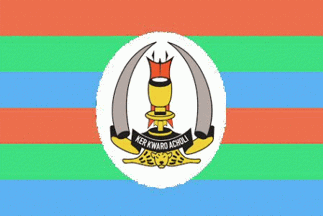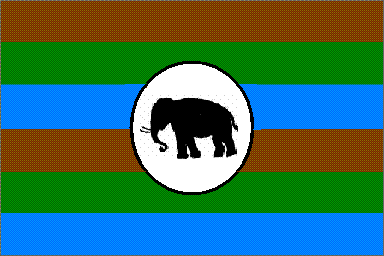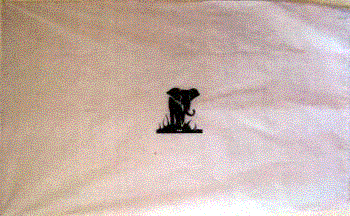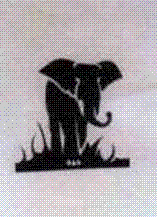ach1.gif) image sent by Ben Cahoon, 27 Feb 2022
image sent by Ben Cahoon, 27 Feb 2022
Last modified: 2022-10-22 by bruce berry
Keywords: uganda | acholi |
Links: FOTW homepage |
search |
disclaimer and copyright |
write us |
mirrors
 image Jean-Marc Merklin, 27 April 2022
See also:
image Jean-Marc Merklin, 27 April 2022
See also:
ach1.gif) image sent by Ben Cahoon, 27 Feb 2022
image sent by Ben Cahoon, 27 Feb 2022
A research paper entitled Ker Kwaro Acholi - A Re-invention of Traditional
Authority in northern Uganda by Clare Paine (Aberystwyth University, UK,
dated March 2014) contains a photograph of a desk flag for the Acholi Kingdom (Ker
Kwaro Acholi) on page 26 which is different to that illustrated below. It has the
same pattern but with slightly different colours and a different seal in the
centre. The seal can also be seen on the Kingdom's Facebook page.
Ben Cahoon, 27 Feb 2022
The flag has the new Arms of the kingdom in centre the replacing the
nation/district symbol shown below.
Jaume Ollé, 03 April 2022
 image by
Chrystian Kretowicz, 02 Mar 2008
image by
Chrystian Kretowicz, 02 Mar 2008
The flag credited as being that of the Acholi Kingdom by John McMeekin (below), is most
likely just a royal flag. On 19 October 2004 the Kampala newspaper, The
Monitor, reported as follows:
"Sgt.Okot Babu (48), on Wednesday hoisted the Acholi flag alongside the National
Flag at 10:22 am in front of the Gulu District Council Hall. The brief
colourful ceremony which was performed amidst ululations from councillors, civil
servants and the public was part of the 11th Council proceedings. The LC5,
Lt.Col.Walter Ochora-Odoch, RDC,Mr.Max Omeda, Rev.Willy Olango (Speaker), and
Richard Muvule (District Police Commander) later inspected a guard of honour
mounted by the district local police led by Gulu Women Empowerment Network (GWENET)
brass band. The motion to adopt the flag was moved by the MP for Koro,
Mr.Latim Baltaza and was unanimously adopted by the council. The flag is
designed like the National flag in brown, green and light blue colours.
There is a black elephant in a white background in the middle of the flag which
is facing the hoisted side with its trunk down just like the Crested Crane is in
the national flag. Latim said the brown colour signifies fertile and
abundant natural resources, green represents evergreen vegetation while light
blue represents abundant water bodies and reliable rainfall. He said the black
elephant is a sign of supremacy and a peaceful nation."
The Acholi ethnic group lives in northern Uganda, in the districts of Gulu,
Kitkum and Pader. Acholiland and neighbouring districts have been ravaged
by the insurgency led by Lord's resistance Army since 1987. The ruler is
at present Rwot Onen David Acana II - Paromount Chief.
Chrystian Kretowicz, 02 Mar 2008
 scan by
John D McMeekin, 31 Mar 2007
scan by
John D McMeekin, 31 Mar 2007A flag of the Acholi Kingdom in the possession of Prof. Michel Lupant (President of FIAV) is 107mm (at hoist) by 172mm (wide) with a white background with a black elephant walking head-on, slightly walking towards the fly, with 3 white nails of his right foreleg (viewers left). The ears and head are drawn in white and the tusk, towards the hoist, is also in white while the the other tusk is black. The trunk swings towards the fly and the elephant is found on a tall grass mount.
 scan by
John D McMeekin, 31 Mar 2007
scan by
John D McMeekin, 31 Mar 2007
Measurement is 22mm in the straight-base of the mount.
22mm top of ears to the base of the mount.
John D McMeekin, 31 Mar 2007